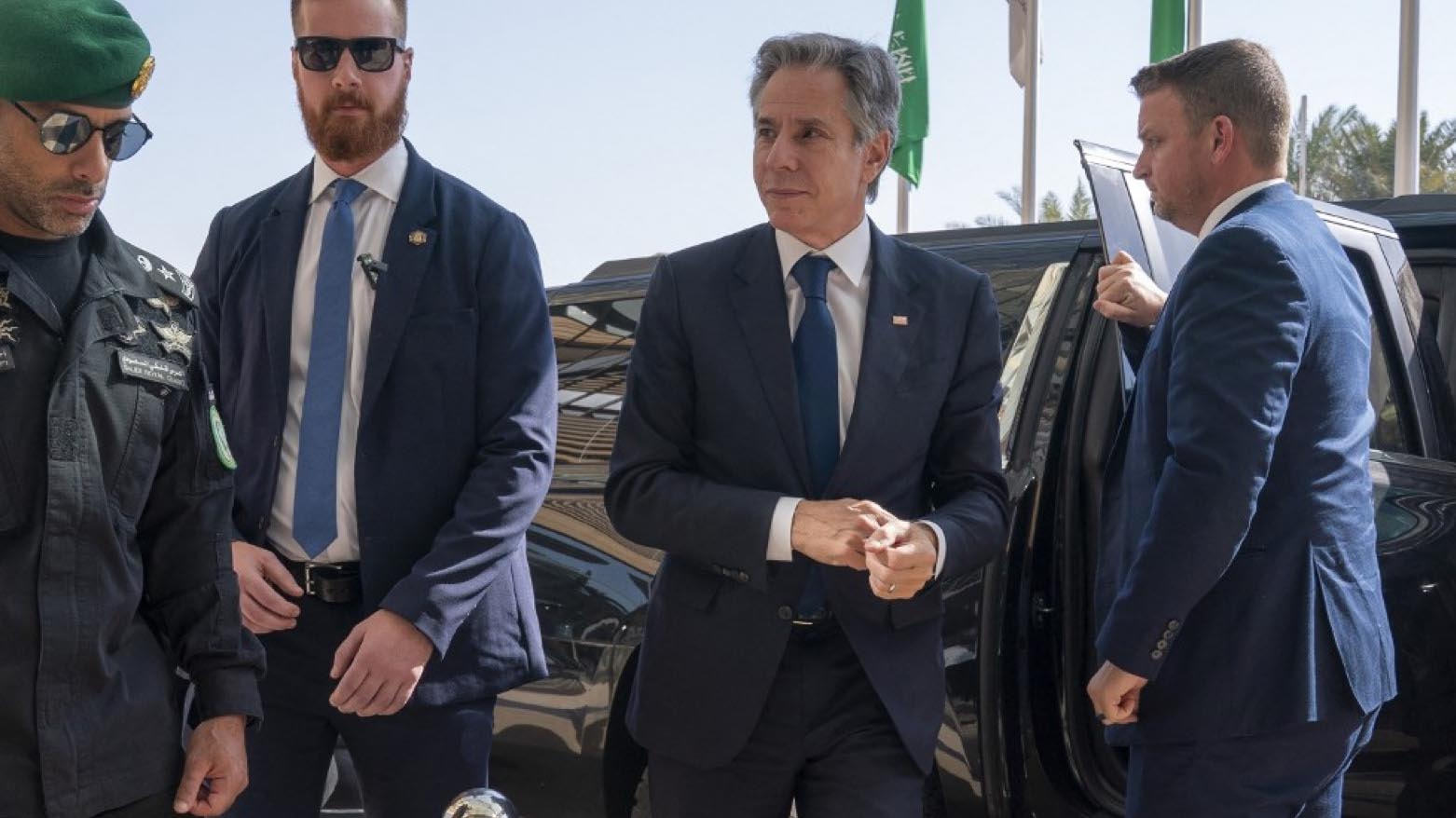U.S. Seeks to Minimize Civilian Casualties, Prevent Expansion of Conflict, as Israel Readies Assault on Gaza

WASHINGTON DC, United States (Kurdistan 24) – As an Israeli ground offensive into the Gaza Strip appeared imminent, the Biden administration has sought to alleviate the suffering of civilians, while preventing the conflict between Israel and Hamas from expanding to other parties.
Toward that end, U.S. President Joe Biden spoke on Saturday with Mahmoud Abbas, President of the Palestinian Authority, which governs the West Bank, as well as Israeli President Benjamin Netanyahu.
In pursuit of the same aims, Secretary of State Antony Blinken continued his tour of Arab states, visiting Saudi Arabia and the United Arab Emirates (UAE) on Saturday.
Notably, Blinken then made a surprise return to Saudi Arabia. He arrived there on Sunday to meet with the country’s Crown Prince and de facto ruler, Mohammed bin Salman. Afterwards, Blinken described the meeting as “very productive.”
Blinken had earlier visited Jordan, Qatar, and Bahrain, while later on Sunday, he is scheduled to hold meetings in Egypt, before returning to Washington.
Blinken also spoke with his Chinese counterpart in an effort to calm tensions, while Secretary of Defense Lloyd Austin visited Israel on Friday to reassure the country of the U.S. commitment to its defense and coordinate U.S. military support.
Biden Speaks with Netanyahu, Abbas
Biden spoke with Netanyahu on Saturday afternoon and “reiterated” America’s “unwavering” support for Israel, while repeating “his warning against anyone seeking to expand the conflict,” according to a White House summary of their discussion.
Biden also said that the U.S. was coordinating “with the United Nations, Egypt, Jordan, Israel, and others in the region to ensure” that civilians have “access to water, food, and medical care,” while he affirmed his support for all efforts to protect civilians.”
“As more information comes to light about Hamas’s brutal atrocities,” the White House summary continued, “Biden reiterated the need for all countries to unequivocally condemn Hamas as a terrorist organization that does not represent the aspirations of the Palestinian people.”
Biden then spoke with Mahmoud Abbas. The conversation marked the first time that Biden had spoken with the Palestinian President.
In that discussion, as a White House summary explained, Biden “condemned Hamas’s brutal attack” and “reiterated that Hamas does not represent the Palestinian people." Abbas, in turn, briefed Biden “on his engagement in the region and his efforts to bring urgently needed humanitarian assistance” to the Palestinian people, while Biden offered his “full support” for Abbas’s efforts.
Biden also “detailed U.S. efforts” to work with its partners “to prevent the conflict from widening,” while the two leaders “discussed the need to preserve stability in the West Bank and the broader region.”
Blinken’s Meetings with Other Arab Leaders, Discussion with Chinese
On Saturday, Blinken arrived in Riyadh, where he met with his Saudi counterpart, Prince Faisal bin Farhan. According to the U.S. summary of their meeting, Blinken stressed the “unwavering focus” of the U.S. “on halting terrorist attacks by Hamas against Israel.”
The foreign ministers also “discussed continued engagement with regional partners to prevent the spread of conflict” and “their shared commitment to taking steps to help protect civilians.”
They also discussed two other hard-hit areas in the Middle East, vowing “to work together to end the devastating conflict in Sudan and secure a lasting peace in Yemen.”
Although it is not evident from the U.S. summary of their discussion, or from the news reporting about it, something in their meeting paved the way for one with bin Salman, and Blinken returned to Riyadh on Sunday for a 7:30 AM meeting with the Crown Prince.
In between those meetings, Blinken had traveled to Abu Dhabi, where he saw Sheikh Mohammed bin Zayed al Nahyan, president of the UAE.
Blinken “expressed appreciation for the UAE’s clear condemnation of Hamas’s heinous attacks on Israeli civilians and continued diplomatic engagement to prevent the spread of conflict,” while the two officials “reaffirmed the importance of the strategic partnership between the United States and the United Arab Emirates,” according to a State Department summary of their meeting.
In addition to his Arab diplomacy, Blinken also spoke with his Chinese counterpart. His aim was to enlist Beijing in the U.S. effort to prevent any widening of the conflict.
Notably, there were no U.S. communications with Russian officials on this matter, as Moscow has basically sided with Hamas.
Indeed, Ukrainian President Volodymyr Zelensky claimed that “the Kremlin aimed to sow division and the war being fought in Gaza and Israel served that aim,” The New York Times reported.
Zelensky also “drew a line between Russia and Iran, both of which, he said, supported Hamas,” it added.
U.S. Secretary of Defense
On Friday, Lloyd Austin arrived in Israel to meet with its leaders “and underscore the unwavering support of the U.S. for the people of Israel and commitment to ensuring Israel has what it needs to defend itself,” according to a Pentagon news release.
In Israel, Austin met with Netanyahu, as well as the country's Minister of Defense, Yoav Gallant. On Saturday, Austin had a follow-up phone conversation with Gallant, in which he “discussed the importance” of protecting civilians and “addressing the worsening humanitarian crisis in Gaza.”
Austin also “provided updates” on the Pentagon’s shipment of “air defense capabilities and munitions” to Israel, while he reiterated that the purpose of such arms deliveries was “to deter any state or non-state actor seeking to escalate this war.”
Subsequently, Austin announced that he had directed a second aircraft Carrier Strike Group to the Eastern Mediterranean to join the USS Dwight D. Eisenhower Carrier Strike Group which is already stationed there.
The purpose of the naval deployments is decidedly not for the U.S. to become involved in any fighting, but, as Austin stated, to deter any other party hostile to Israel from joining in the conflict.
